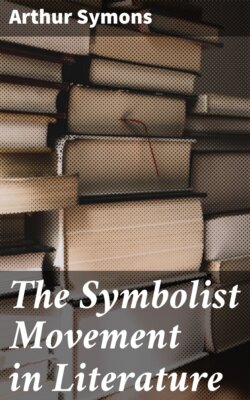Читать книгу The Symbolist Movement in Literature - Symons Arthur - Страница 6
На сайте Литреса книга снята с продажи.
2
ОглавлениеThe two books into which Balzac has put his deepest thought, the two books which he himself cared for the most, are Séraphita and Louis Lambert. Of Louis Lambert he said: "I write it for myself and a few others"; of Séraphita: "My life is in it." "One could write Goriot any day," he adds; "Séraphita only once in a lifetime." I have never been able to feel that Séraphita is altogether a success. It lacks the breadth of life; it is glacial. True, he aimed at producing very much such an effect; and it is, indeed, full of a strange, glittering beauty, the beauty of its own snows. But I find in it at the same time something a little factitious, a sort of romanesque, not altogether unlike the sentimental romanesque of Novalis; it has not done the impossible, in humanising abstract speculation, in fusing mysticism and the novel. But for the student of Balzac it has extraordinary interest; for it is at once the base and the summit of the Human Comedy. In a letter to Mme. de Hanska, written in 1837, four years after Séraphita had been begun, he writes: "I am not orthodox, and I do not believe in the Roman Church. Swedenborgianism, which is but a repetition, in the Christian sense, of ancient ideas, is my religion, with this addition: that I believe in the incomprehensibility of God." Séraphita is a prose poem in which the most abstract part of that mystical system, which Swedenborg perhaps materialised too crudely, is presented in a white light, under a single, superhuman image. In Louis Lambert the same fundamental conceptions are worked out in the study of a perfectly human intellect, "an intelligent gulf," as he truly calls it; a sober and concise history of ideas in their devouring action upon a feeble physical nature. In these two books we see directly, and not through the coloured veil of human life, the mind in the abstract of a thinker whose power over humanity was the power of abstract thought. They show this novelist, who has invented the description of society, by whom the visible world has been more powerfully felt than by any other novelist, striving to penetrate the correspondences which exist between the human and the celestial existence. He would pursue the soul to its last resting-place before it takes flight from the body; further, on its disembodied flight; he would find out God, as he comes nearer and nearer to finding out the secret of life. And realising, as he does so profoundly, that there is but one substance, but one ever-changing principle of life, "one vegetable, one animal, but a continual intercourse," the world is alive with meaning for him, a more intimate meaning than it has for others. "The least flower is a thought, a life which corresponds to some lineaments of the great whole, of which he has the constant intuition." And so, in his concerns with the world, he will find spirit everywhere; nothing for him will be inert matter, everything will have its particle of the universal life. One of those divine spies, for whom the world has no secrets, he will be neither pessimist nor optimist; he will accept the world as a man accepts the woman whom he loves, as much, for her defects as for her virtues. Loving the world for its own sake, he will find it always beautiful, equally beautiful in all its parts. Now let us look at the programme which he traced for the Human Comedy, let us realise it in the light of this philosophy, and we are at the beginning of a conception of what the Human Comedy really is.
